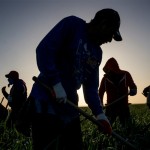A broad coalition of Texas farm and business leaders will hold a livestream press event on farm labor shortage Thursday, Sept. 22, at 10 a.m. CST. Watch Livestream HERE
The group consists of the American Business Immigration Coalition Action (ABIC Action), Texas International Produce Association, Little Bear Produce, City of McAllen Mayor Javier Villalobos, and City of Edinburg Mayor Ramiro Garza Jr., all participating in a press conference and roundtable entitled “Lower Food Prices, Keep Shelves Stocked: Common Sense Solutions to Texas’ Farm Labor Shortage.”
The event is the latest in a multistate series of events with agricultural stakeholders to call attention to the urgency of fixing the nation’s farm labor shortage by passing new Senate agriculture workforce solutions.
The press conference, “Lower Food Prices, Keep Shelves Stocked: Common Sense Solutions to Texas’ Farm Labor Shortage,” will include comments by Dante Galeazzi, President & CEO, Texas International Produce Association; Bret Erickson, Senior Vice President of Business Affairs, Little Bear Produce; Gerry Garcia, Vice President of Special Projects & Government Affairs, McAllen Chamber of Commerce; Mayor Javier Villalobos, City of McAllen; Mayor Ramiro Garza, City of Edinburg; and Juan Carlos Cerda, Texas State Director and Deputy Campaign Director, ABIC – Action. The 10 a.m. event is being held at Little Bear Produce, 7310 N Expressway 281, Edinburg, TX 78542.
Additional background on the Texas farm labor shortage is provided in this recent piece by Galeazzi. Its highlights look at:
- In the past, South Texas had a strong labor pool of both Americans who lived in the area and Mexican citizens who crossed the border daily with a visa. But that labor force has plummeted in recent years. Between 2002 and 2014, the number of full-time field and crop workers in the U.S. dropped by more than 20 percent — at least 146,000 people — according to New American Economy (NAE). And the Southern Plains region of Texas and Oklahoma lost approximately 6,000 full-time workers during that time.
- When farmers post hiring notices for low-skilled labor in areas like planting, cultivating, or harvesting, U.S. workers take those jobs only 6 percent of the time, according to the Department of Labor.
- Across the U.S., if labor shortages were not an issue, the production of these crops would be worth an additional $3.1 billion per year, according to NAE, plus $2.8 billion in spending on related services. It would also create more than 41,000 additional non-farm jobs for Americans each year.
The coalition noted in its release, “On the national level, Texas A&M International University recently released data from a new economic study on the link between stabilizing the agricultural workforce and decreasing inflation and consumer prices, showing that ensuring farmers have a stable, secure, reliable, and legal workforce is crucial to keeping America’s grocery shelves stocked, combating inflation, and lowering food prices (including milk, eggs, meat, and produce) for all domestic consumers.
“Addressing workforce shortages facing farm employers and stabilizing the H-2A visa application process is also crucial for enhancing our national food security by protecting domestic agriculture production. According to the USDA, next year, for the first time in U.S. history, we as a country will be importing more agricultural goods than we export.
“In 2021, the U.S. House of Representatives passed the Farm Workforce Modernization Act with bipartisan support. That was a good start, and now in the Senate, Senators Mike Crapo (R-ID) and Mike Bennet (D-CO) have taken the lead on negotiating improvements on the House’s solutions and moving the process forward. Passing new Senate legislation is critical to solving labor shortages facing the Texas agriculture sector and sustaining the state’s economy as a whole. “According to the American Farm Bureau Federation, grocery bills are rising at the fastest pace in more than 40 years, and this year’s July 4th cookouts cost 17 percent more than last year and 27 percent more than before the pandemic. Prices for ground beef are up 36 percent from last summer, chicken breasts up 33 percent, pork and beans up 33 percent, pork chops up 31percent, lemonade up 22 percent, and potato salad up 19 percent – some families were likely forced to skip a cookout altogether.”


